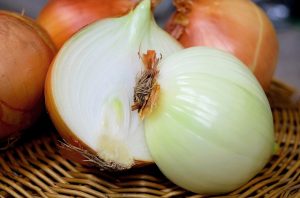Top 5 Health Benefits of Onions

Onions
What are onions?
Onions are botanically part of the lily (Liliaceae) family, along with garlic, shallots and leeks. Although not valued as highly as garlic, onions contain potent compounds which are known to benefit health.
Onions form the basis of a wide variety of dishes, whether eaten raw, sautéed, baked, steamed or boiled.
Discover our full range of health benefit guides or check out some of our best onion recipes, from our tangy red onion chutney to our ultimate makeover onion tart.
Top 5 health benefits of onions
-
Rich in antioxidant compounds
Onions are loaded with plant chemicals including flavonoids, which have both an antioxidant and anti-inflammatory effect. When consumed regularly and in sufficient quantity, these compounds may help protect against chronic conditions such as cancer and diabetes. In fact, onions contain over 25 different flavonoids and are one of the richest sources in our diets.
Onions also have sulfur-containing compounds, which have been demonstrated to be protective against certain cancers.
-
May support heart health
One of the flavonoids in onions, quercetin, has protective antioxidant and anti-inflammatory effects and it’s thought this, as well as other beneficial compounds present in onions, may contribute to the vegetable’s heart-friendly properties.
Studies suggest eating onions may help reduce your risk of heart disease by lowering blood pressure, managing cholesterol levels and reducing inflammation.
-
May support bone health
Including onions in the diet is associated with improved bone density. This may be because of their antioxidant properties, which reduces oxidative stress and appears to reduce bone loss.
A study looking at the effect on peri- and post-menopausal women reported that frequent onion consumption decreased the risk of hip fracture. A further study on middle-aged women showed onion juice consumption reduced bone loss and improved bone density.
-
May support gut health
Onions are rich in fiber, especially the non-digestible type that is needed to maintain gut health. Although we can’t digest prebiotic fiber, the bacteria that live in our gut do and they use it as fuel to help increase their numbers and produce by-products called short-chain fatty acids (SCFAs). Research shows that these SCFAs are important for maintaining the health and integrity of the gut and supporting our immunity and digestion.
-
Antibacterial
Used in folk medicine for the relief of coughs, colds and catarrh, studies support that onions have valuable antibacterial properties against the likes of Escherichia coli, Pseudomonas aeruginosa and Staphyloccus aureus. What’s more, it’s older, stored onions that appear most potent. Once again, it seems quercetin is of value here, because it has the power to inhibit the growth of Helicobacter pylori and Methicillin-resistant Staphylococcus aureus (MRSA).
Are onions safe for everyone?
An allergy to onions is rare, but some people do have a sensitivity to them. As a result, those who are allergic may experience digestive issues, including heartburn and wind. Onions contain FODMAPs , a type of carbohydrate and fiber that some people find their digestive system cannot tolerate.
Globe onions should be clean and hard and have dry, smooth skins. Avoid onions with a developed seed stem and those that show signs of decay. Onions should be stored at room temperature, away from bright light and in a well-ventilated area. Those that are more pungent in flavor, such as yellow onions, will keep longer than those with a sweeter taste, such as white onions, because the compounds that produce the sharp taste are natural preservatives. All onions should be stored away from potatoes, as they will absorb their moisture and ethylene gas, causing potatoes to spoil more easily. Do not store cooked onions in a metal bowl or storage container, as this will cause them to discolor. Freezing chopped onions will cause them to lose much of their flavor.
The compound allyl sulphate, which is produced when an onion’s ruptured cells are exposed to air, is responsible for producing tears. To reduce the production of this compound, chill the onions for 30 minutes or so before cutting to reduce the activity of the enzyme.
Source: www.bbcgoodfood.com
